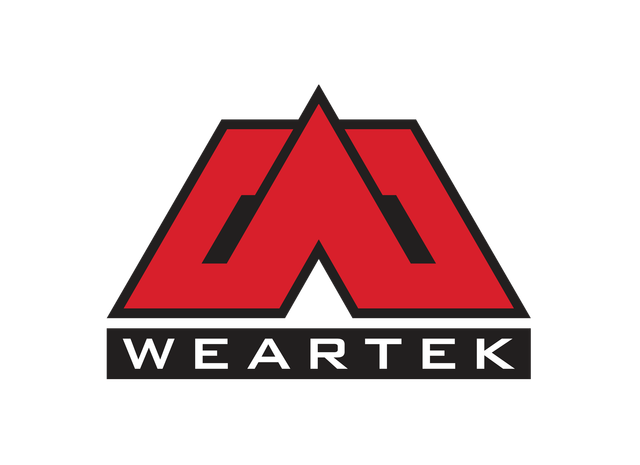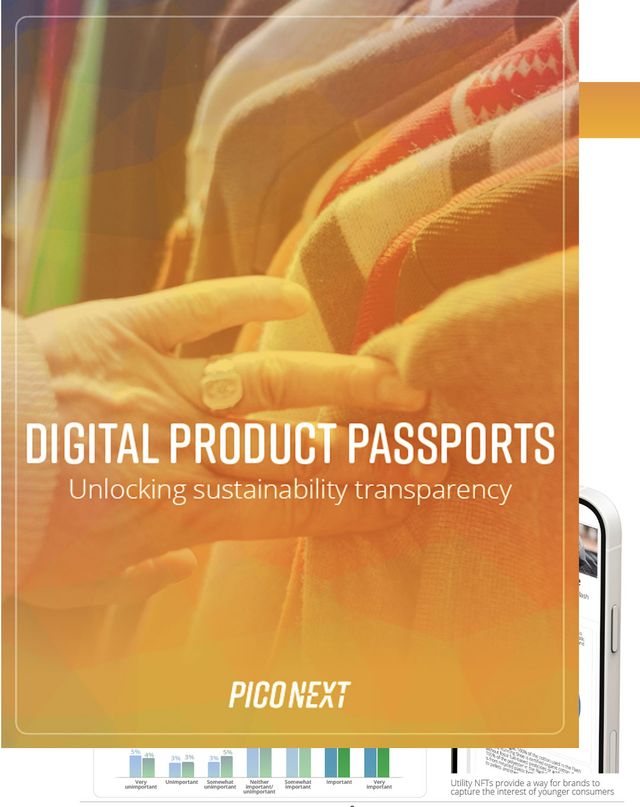Weartek is an Australian manufacturer of high-quality, performance apparel products for workers in mining, oil and gas, construction, government, and emergency services industries. With a focus on recycled, renewable, and sustainable materials, Weartek not only equips front-line employees with fire and electrical-resistant workwear — but does so in an environmentally responsible way.
Performance-based sustainability at every turn
Its Weartek Zero line, for example, integrates recycled plastics in the synthetic yarn used to make its safety-oriented work shirts and trousers. In addition, the company focuses on diverting used garments from landfills through its innovative Product Reclaim programme. Through these initiatives, and more, Weartek has positioned itself as Australia’s leading supplier of sustainable, work-oriented performance apparel.
Using DPPs to communicate clearly to customers
Because sustainability is at the core of Weartek’s brand, the company wanted to communicate its efforts to customers in a clear and consistent way. It turned to the emerging Digital Product Passport standard as a way to showcase both technical product features and sustainability attributes for its new Weartek 4836 performance clothing line. The Weartek 4836 line includes personal protective equipment (PPE) that meets local regulatory standards for electrical contractors working safely around low-voltage lines, including through Arc Flash protection and high-visibility standards compliance.

Innovative workwear focused on environmental responsibility
“Our mission at Weartek is to deliver innovative, high-quality workwear that focuses on worker safety,” said Nick Pearce, Founder and Managing Director at Weartek with over two decades of experience in apparel design. “We also incorporate circular economy principles into our work, ensuring that each garment we deliver is designed to promote sustainable consumption.”

Our mission at Weartek is to deliver innovative, high-quality workwear that focuses on worker safety.
We also incorporate circular economy principles into our work, ensuring that each garment we deliver is designed to promote sustainable consumption.
Encouraging responsible clothing disposal
In addition to the company’s manufacturing work with environmentally accredited partners and its efforts to reduce its carbon footprint, Weartek also focuses on responsible apparel disposal. Its Product Reclaim programme encourages customers to return used Weartek garments to the company for responsible disposal, as a way to take full accountability for the entire lifecycle of the product.
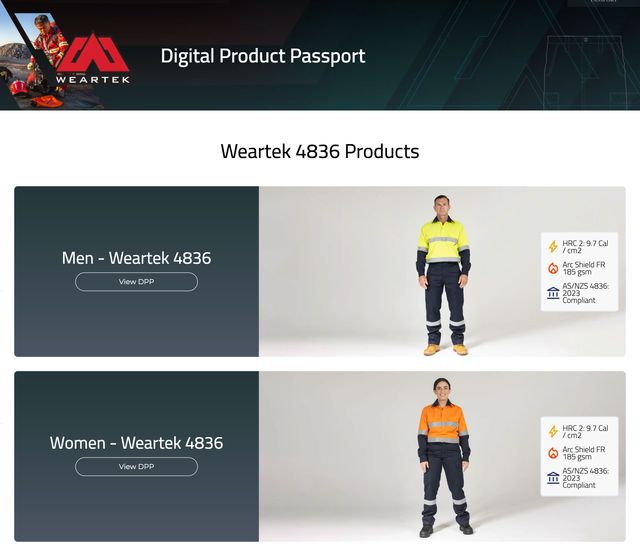
Accelerating Digital Product Passport creation with AI
In order to accelerate its Digital Product Passport creation, Weartek turned to new AI-enabled features in PicoNext. The company, in collaboration with its sustainability consulting partner Circular Society, used the PicoNext AI Assistant to summarise raw sustainability data and prepare it for publication. The PicoNext AI Assistant enabled Weartek to speed the creation of its baseline Digital Product Passport, which it then reviewed and refined before finalising for publication.
“Using the PicoNext AI Assistant, we quickly distilled complex, raw data for our Weartek 4836 line of performance workwear products into customer-facing Digital Product Passports,” said Pearce. “With our AI-powered DPPs, we differentiated Weartek with potential customers using our sustainability data — at a fraction of the time and cost than it otherwise would have taken us to do so.”
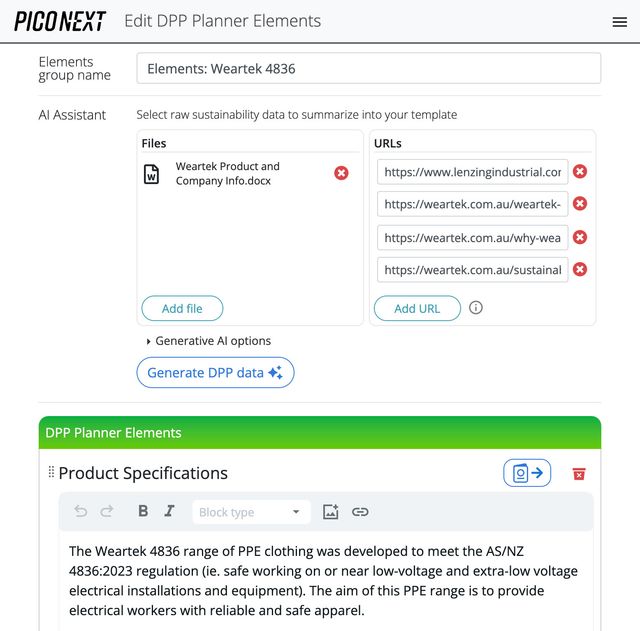
Connecting DPP with brand experience
To maintain a cohesive and engaging brand experience for its customers, Weartek developed a branded microsite that displays its Digital Product Passport data. The site showcases the Weartek 4836 products along with Weartek’s brand assets and messaging, and pulls in the DPP data using PicoNext Enterprise APIs.
In addition, Weartek was able to quickly produce phase one of its DPP microsite by integrating cloud-based DPPs published directly from the PicoNext DPP Planner — a one-stop tool to organise and manage product sustainability data. Because the DPPs are hosted in the cloud, they can be refreshed easily as supplier or manufacturing partner data is updated.
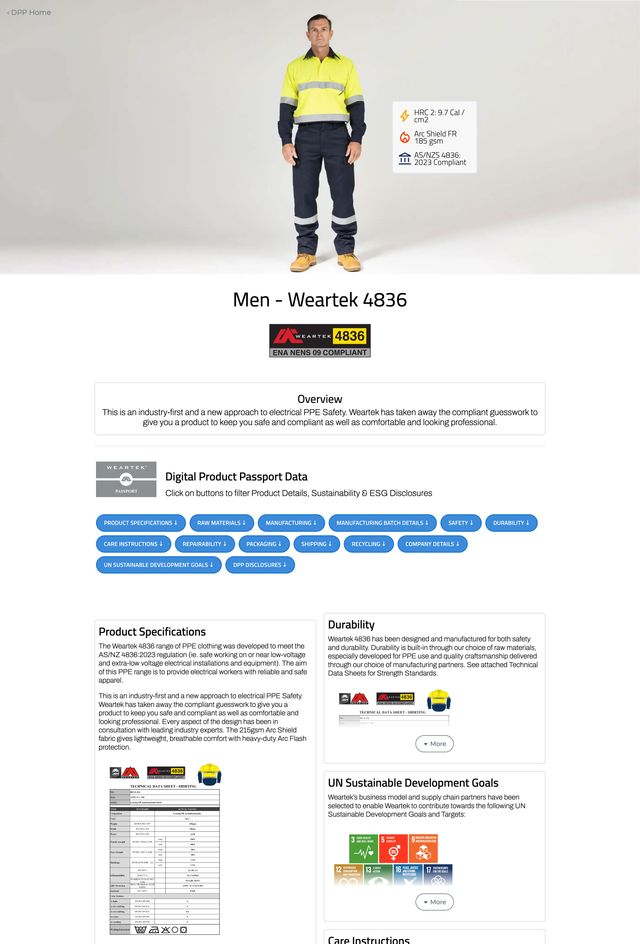
Getting granular with DPP Item- and Batch-level data
In phase two of its Digital Product Passport, Weartek will launch item- and batch-level data in its DPP as a way to highlight responsible disposal of apparel through its Product Reclaim programme. Using the PicoNext DPP Item- and Batch-level capabilities, it can define item-level data to report on, update that data either via API or manually, and then include item-level data in the DPP.
For example, the company can update the disposal status of each garment and allow customers to track that status in the DPP. Rather than producing an individual DPP to show the status of each garment, PicoNext enables Weartek to include item-level data as a searchable field in the overall DPP in order to provide one unified DPP and brand experience to the end-user. Customers can see DPP data for the product model, and individual item-level data on the status of product disposal – all in one place.
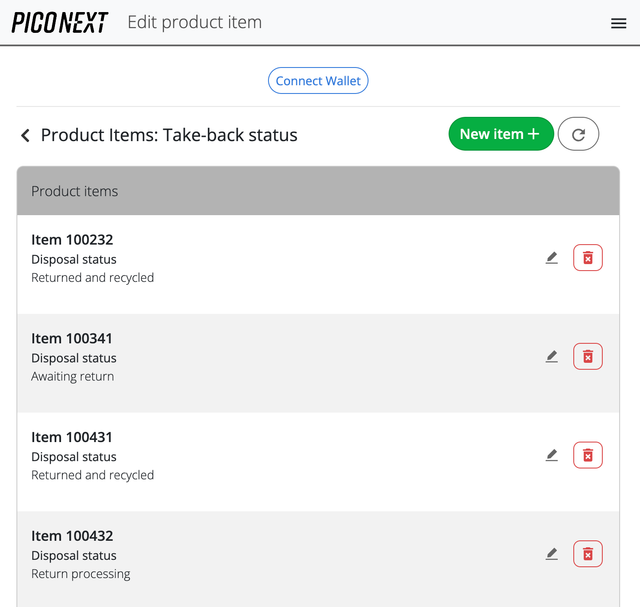

Digital Product Passports are a game-changer for us to highlight not only the technical innovations of our performance workwear, but allow us to attract new customers through the sustainability initiatives that are part of our brand promise.

Flexible publishing with DPP Planner Elements
Weartek also accelerated its Digital Product Passport publishing workflow by using DPP Planner Elements, a new capability in PicoNext that allows organisations to create "groups" of reusable sustainability attributes and share them across products. This templatized approach allows multiple products to share attribute groups, enables easy updating of DPP product data in one place, and permits one-off product data customisation even when using an element group. DPP Planner Elements simplify data management by allowing brands to update the content in one place, which then reflects across products.
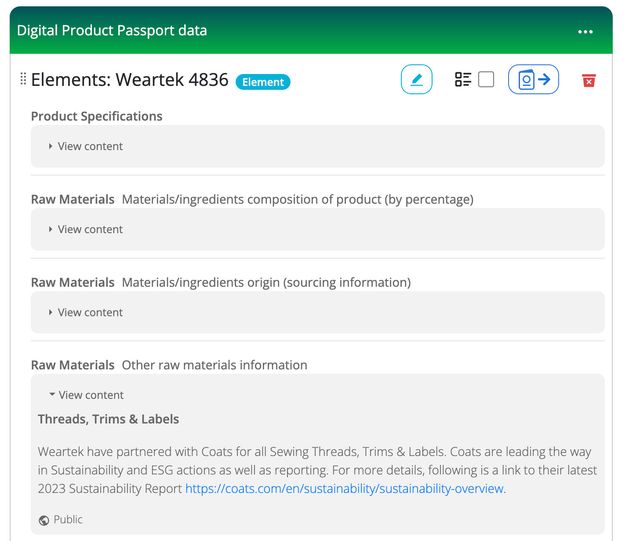
Driving full circularity with Digital Product Passports
With its Digital Product Passport, Weartek seeks to drive full circularity for its performance workwear apparel – driving transparency around each stage of the sustainability lifecycle with customers through enhanced data visibility. And already, Weartek has seen its Digital Product Passport concept has driven increased interest with sales prospects, and enthusiasm among other stakeholders.
“Digital Product Passports are a game-changer for us to highlight not only the technical innovations of our performance workwear, but allow us to attract new customers through the sustainability initiatives that are part of our brand promise,” said Pearce. “And with item- and batch-level reporting in our DPP roadmap, we’re looking forward to closing the loop on full circularity with our products.”
Learn more about the Weartek DPP
- Weartek DPP. View the AI-powered Digital Product Passport for the Weartek 4836 line of performance workwear at https://dpp.weartek.com.au/

